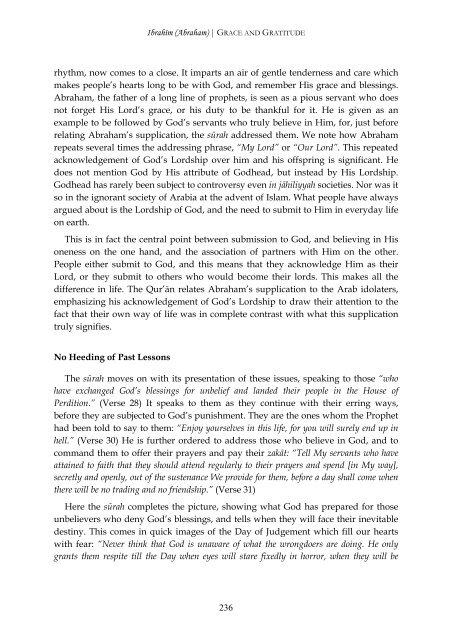Volume 10 Surah 12 - 15 - Enjoy Islam
Volume 10 Surah 12 - 15 - Enjoy Islam
Volume 10 Surah 12 - 15 - Enjoy Islam
You also want an ePaper? Increase the reach of your titles
YUMPU automatically turns print PDFs into web optimized ePapers that Google loves.
Ibrahīm (Abraham) | GRACE AND GRATITUDE<br />
rhythm, now comes to a close. It imparts an air of gentle tenderness and care which<br />
makes people’s hearts long to be with God, and remember His grace and blessings.<br />
Abraham, the father of a long line of prophets, is seen as a pious servant who does<br />
not forget His Lord’s grace, or his duty to be thankful for it. He is given as an<br />
example to be followed by God’s servants who truly believe in Him, for, just before<br />
relating Abraham’s supplication, the sūrah addressed them. We note how Abraham<br />
repeats several times the addressing phrase, “My Lord” or “Our Lord”. This repeated<br />
acknowledgement of God’s Lordship over him and his offspring is significant. He<br />
does not mention God by His attribute of Godhead, but instead by His Lordship.<br />
Godhead has rarely been subject to controversy even in jāhiliyyah societies. Nor was it<br />
so in the ignorant society of Arabia at the advent of <strong>Islam</strong>. What people have always<br />
argued about is the Lordship of God, and the need to submit to Him in everyday life<br />
on earth.<br />
This is in fact the central point between submission to God, and believing in His<br />
oneness on the one hand, and the association of partners with Him on the other.<br />
People either submit to God, and this means that they acknowledge Him as their<br />
Lord, or they submit to others who would become their lords. This makes all the<br />
difference in life. The Qur’ān relates Abraham’s supplication to the Arab idolaters,<br />
emphasizing his acknowledgement of God’s Lordship to draw their attention to the<br />
fact that their own way of life was in complete contrast with what this supplication<br />
truly signifies.<br />
No Heeding of Past Lessons<br />
The sūrah moves on with its presentation of these issues, speaking to those “who<br />
have exchanged God’s blessings for unbelief and landed their people in the House of<br />
Perdition.” (Verse 28) It speaks to them as they continue with their erring ways,<br />
before they are subjected to God’s punishment. They are the ones whom the Prophet<br />
had been told to say to them: “<strong>Enjoy</strong> yourselves in this life, for you will surely end up in<br />
hell.” (Verse 30) He is further ordered to address those who believe in God, and to<br />
command them to offer their prayers and pay their zakāt: “Tell My servants who have<br />
attained to faith that they should attend regularly to their prayers and spend [in My way],<br />
secretly and openly, out of the sustenance We provide for them, before a day shall come when<br />
there will be no trading and no friendship.” (Verse 31)<br />
Here the sūrah completes the picture, showing what God has prepared for those<br />
unbelievers who deny God’s blessings, and tells when they will face their inevitable<br />
destiny. This comes in quick images of the Day of Judgement which fill our hearts<br />
with fear: “Never think that God is unaware of what the wrongdoers are doing. He only<br />
grants them respite till the Day when eyes will stare fixedly in horror, when they will be<br />
236

















